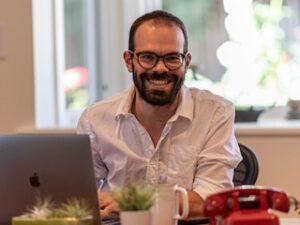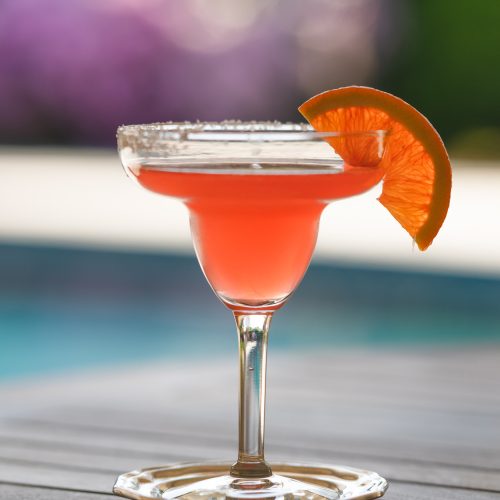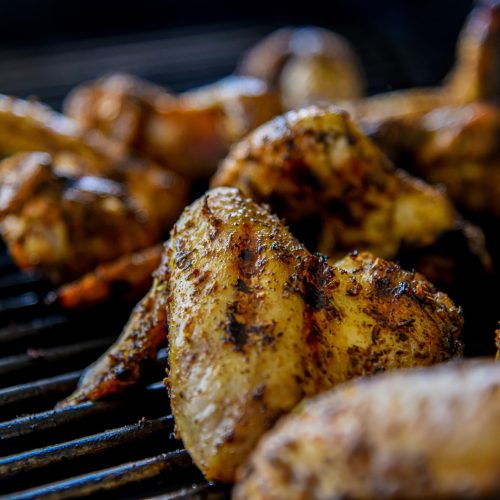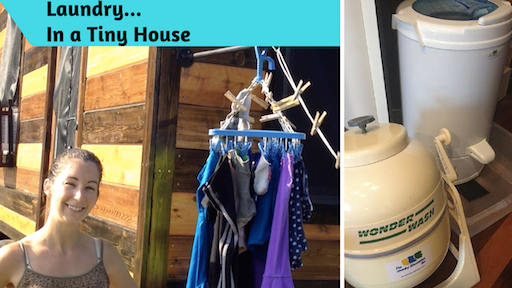Subscribe to Spark Chasers on your favorite platform:
In this episode of Spark Chasers, Michael Kahn engages in a fascinating conversation with Chris Glab, the innovative mind behind Wildbrine and the Chief Innovation Officer at Bubbies Fine Foods and Fermented Food Holdings. Recorded at the bustling Natural Products Expo West, this dialogue delves into the intricate world of fermentation and food cultures, showcasing Glab’s passion for crafting unique, flavorful, and health-conscious fermented foods.
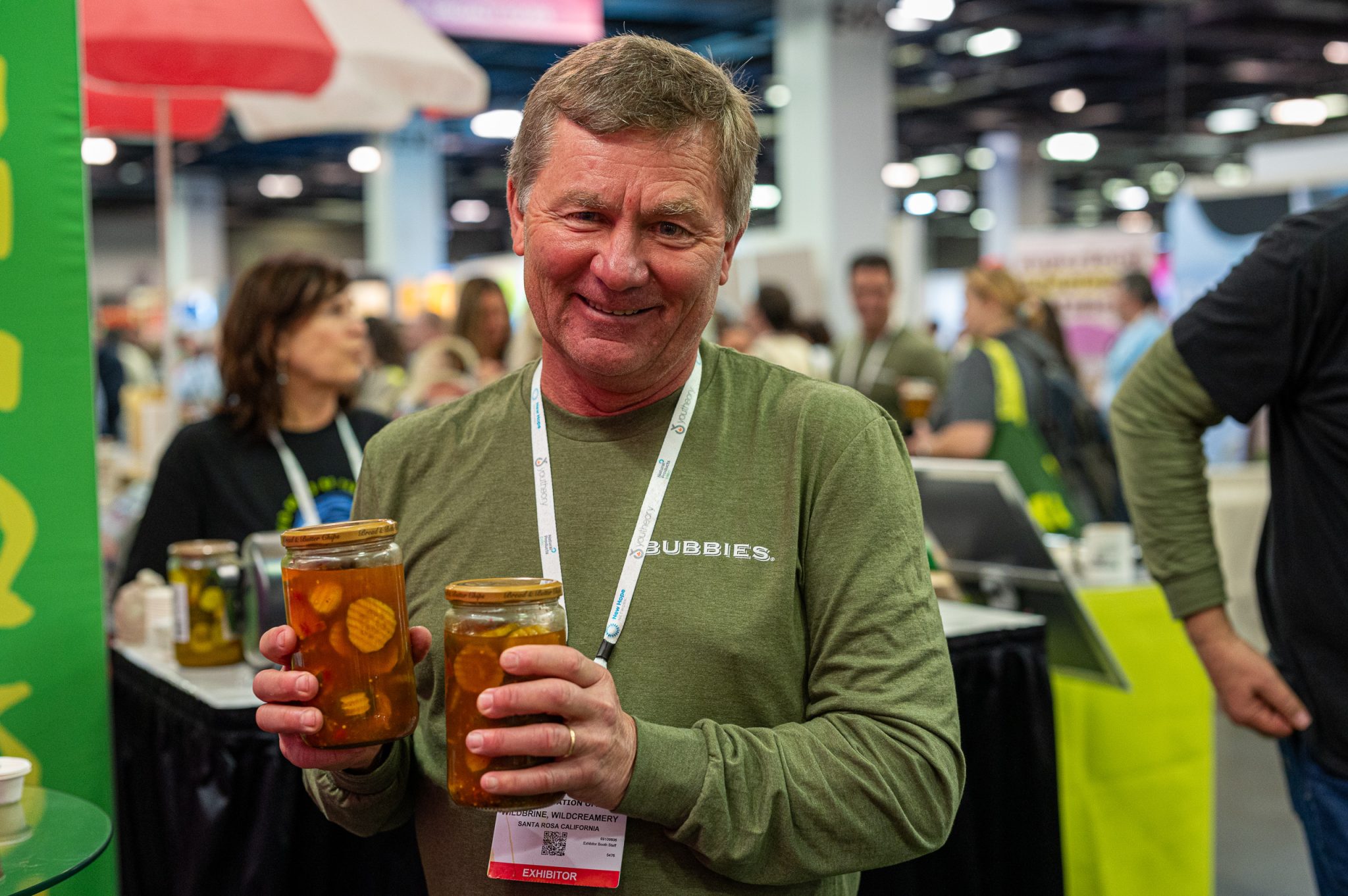
A pioneer in the fermentation industry, Glab shares insights into his journey from starting with live, raw fermented sauerkrauts, kimchis, and srirachas to venturing into plant-based dairy alternatives, all while emphasizing the importance of texture as a critical component of flavor.
Glab’s dedication to using whole, real ingredients in his fermentation processes stands out as he discusses the development of new products like the banh mi medley and various bread and butter pickles.
His approach to fermentation is not just about preserving food but enhancing its nutritional value, making it more bioavailable and digestible.
This episode not only highlights Glab’s innovative contributions to the fermented food industry but also his belief in the power of real food and traditional methods to promote gut health and boost the immune system. Through his work, Glab continues to push the boundaries of fermentation, proving that food can be both delicious and healthful.
A while back Bubbies had hired me to showcase their sauerkraut in a recipe which you can try for yourself here: Recipe
Transcript
Chris Glab: Oh, you have to check it out. It’s, it was a surprise. For me, it’s my favorite. Just because it’s, you just don’t see anything like that
Texture is just as important a component of flavor as is the taste itself. You eat in three ways. You look at the products, you eat them with your eyes, and then you sense the texture.
Michael Kahn: Hey, you’re listening to Spark Chasers and this is Michael Kahn. In this episode, I interview Chris Glab, founder of Wild Brine and chief innovation officer for Bubby’s Fine Foods and Fermented Food Holdings.
When I first recorded this episode, I didn’t plan on it being used for a podcast, and it was recorded purely to take notes on the showroom floor of Natural Products Expo West in 2023 interview was a lot of fun, and I’m really excited to be able to share this.
This episode is sponsored by The Weekly Driver. Go to TheWeeklyDriver. com for car reviews and automotive news, some of which are written by yours truly. Alright, here’s Chris.
Chris Glab: Okay, so I’m Chris Glab, the founder of Wild Brine. We manufacture all live, raw, fermented. We started with all live, raw, fermented sauerkrauts, kimchis, srirachas. Recently, we’ve introduced a line of vinegar pickled items, but really specialty items like a banh mi medley, a Latin American slaw that’s called a potito, escabeche, and we have pickled red onions. Our core kraut line is you certainly have the core green kraut, but my favorite’s the dill and garlic. Red beet and red cabbage, sauerkraut, and we got specialty items like apple caraway, jalapeno lime. Then we ventured into plant based dairy. Because we’re fermenters, we we made the cultures in the very same way that we make our sauerkrauts and kimchi. We just fermented plants instead of fermenting milk as they do in the dairy industry to come out with a butter, cream cheese, sour cream, and plant based creamery style dips. Really big time fermenters. We acquired Bubby’s or we were combined with Bubby’s, and then I started working on that front to do the new product development with bread and butter pickles, kosher dill pickles, and now I’m starting also to do the innovation at G.L.K. Sauerkraut in Wisconsin. So my title, while I was the founder of Wild Brine, in fermented food holdings, I am, I’ve got a title that says Chief Innovation Officer. Really what it means is I work in the kitchen most days developing new products, refining products, helping to launch products. So we haven’t a lot of new items here at the show. I mentioned the wild vine items like the Bon Me Medley, which is a next to finalist, a great item.
Michael Kahn: I tried that. It was really good.
Chris Glab: Thank you. Thanks. And it’s neat because it could be used as a side salad. It could be used as a condiment on a sandwich. So it’s got some real flexibility and usage.
Michael Kahn: And it holds up on its own really well too.
Chris Glab: And it’s, it’s done the right way. It’s got the jalapenos in there for kick. It’s got that citrusy kick of lime and it’s got that warm note of cilantro, so you really get that feeling of this is, real bahn mi. On the Bubby side, what’s new here at the show are three new bread and butter items. A spicy Fresno bread and butter, a horseradish bread and butter, and an apple ginger bread and butter.
Michael Kahn: Oh, I didn’t even see the apple ginger. I’ll have to check that out.
Chris Glab: Oh, you have to check it out. It’s, it was a surprise. For me, it’s my favorite. Just because it’s, you just don’t see anything like that in the bread and butter category.
Michael Kahn: Yeah, that’s an unusual combination, but it makes sense just to
Chris Glab: Oh, I’ve got some crazy stuff to show you here.
Michael Kahn: Okay, no, I’m game.
Chris Glab: What we did that’s different, it’s Did you did taste them?
Michael Kahn: Yes.
Chris Glab: If you looked at the jars, I took the same approach that I’ve always done with Wild Brine to the Bubby’s Pickle category, and that is I always wanted to get flavor through real whole ingredients. If you look at the pickle category, there are flavors out there, but they’re done in a cheap and easy way. Fly a plane over with some herbs and spices and drop them in, put a little fresh red pepper in. Here I used real whole ingredients to flavor them. So the spicy, we start with whole Fresno peppers. I like Fresno because it’s got a medium heat, but it’s got a really great, rounded pepper taste. So I’ve got pieces of diced Fresno peppers in there and our horseradish. We peel horseradish and we dice it. We’ve got real diced pieces of horseradish in it. In our apple ginger, we peel ginger. We’ve got coins of ginger.
Michael Kahn: You said what of ginger?
Chris Glab: Coins. So a coin cut. So you’ve got a round sort of diameter to it. So instead of dicing it to make it look different, have some interest in there, it looks like a quarter, basically, so that, that’s the important thing.
Michael Kahn: Okay.
Chris Glab: And then we’ve got huge Granny Smith apples in there. We walk down the aisle, we see those items. You don’t just read it on the label, you eat with your eyes. You see the real pieces of those ingredients in there. You taste it.
Michael Kahn: Why’d you go with the Granny Smith variety?
Chris Glab: It’s Bubby. I think, Bubby, what kind of apple is she gonna use? She’s gonna use a Granny Smith.
Michael Kahn: You think so?
Chris Glab: She’s a granny.
Michael Kahn: Is that your reasoning? Really?
Chris Glab: I, after the fact, it was. I actually like the tartness, the sweet tartness of a Granny Smith. I think it goes well with the bread and butter flavor profile. If you were to use a sweeter apple Red Delicious let’s just say, I don’t think you’d get the complexity. And you think, if you think about a bread and butter, you get the sweetness from the sugar, but you get the tartness from the vinegar. Granny Smith, you get the tartness of the acid that’s in that apple, but you also get the sweetness in that apple. So I think it works really nice in there.
Michael Kahn: Was texture a consideration for the fermentation process of an apple or not so much?
Chris Glab: And I’m glad you brought that up because the Granny Smith holds up a lot better than some other apples. We probably all had a red delicious. That’s kind of mushy. I love honey crisps. That would have been my choice in there, too.
Michael Kahn: But also it’s a really sweet one
Chris Glab: But it’s a little bit sweeter. But if you look across the wild grind line and you look across the bubbies line Texture is just as important a component of flavor as is the taste itself. So you’ll find across our line that everything, there’s a consciousness to the texture. And the apples held up well. Don’t have to worry about the ginger holding up. It’s nice and soft and really good. It’s a Fresno’s, it’s a pepper, it’s a little bit soft, but the nature of our process is it still keeps a nice texture and the horseradish is going to hold up like the ginger. And you’ll find the pickled chips themselves are really nice and crunchy.
Michael Kahn: Crunch is a very important factor for chips.
Chris Glab: You eat in three ways. You look at the products, you eat them with your eyes, and then you sense the texture. Those are important. Another really important aspect, everything that we do, and I want to emphasize this. All our stuff’s vegan, most of it’s organic, we’re non GMO, we’re gluten free. So we really emphasize the health of this, these products, but for us, food is about culinary. Food is flavor. You could be the healthiest product in the world, but if it doesn’t taste good, people aren’t gonna buy it and eat it, if they just want the health of it they’re gonna take a supplement. So for us, the first and most important component is, does it taste good? And the secondary benefit To get you over the hump is if you can give a health benefit to it then you feel good about what you’re eating and eating as much as you want and you feel great about it. So while there, people come by sometimes and they say, your products are live, raw, fermented, probiotic. What kind of probiotic organisms do you have in there and what is the counter list? It’s you know what, how did Bubby eat? How did people eat for ages? You eat real food, you do it the right way. Mother nature will take care of you. Through the fermentation and the portfolio of organisms that do all that, and you’re gonna have gut health, you’re gonna be boost your immune system. Fermentation helps break down the food itself. So it’s more easily digested. That’s an interesting point. I don’t know if you know this, but yogurt for instance, it’s a fermented product. There are a lot of people who are allergic to dairy and they’re lactose intolerant, but they can eat yogurt. Why is that? Because it’s fermented. It takes that complex lactose compound, molecule, and it breaks it down to more simple sugars. Likewise in our products, it breaks down those vegetables to more simple components that are more bioavailable. So if you were to eat, if you were to eat fresh cabbage and you get a lot of great vitamins and minerals, nutrients, if you eat fermented cabbage, you’re going to get even more because you’re not going to be able to take advantage of all of those vitamins, minerals, and nutrients, your body alone. It’ll pass some of those through, but fermentation makes them more bioavailable. You’re going to get even more nutrition out of it.
Michael Kahn: And your point about yogurt made me think about a lot of people who can’t eat soft cheese are totally fine with the hard cheese.
Chris Glab: Yeah, it’s cultured, it’s got, there’s a fermentation to it. That’s exactly right. Fermentation is just a magical art and science, and I still don’t think we know everything about the benefits of it.
Michael Kahn: Yeah, I’m with you on that. Okay, so are you ready for some hard questions?
Chris Glab: Shoot.
Michael Kahn: Okay what’s your favorite culture?
Chris Glab: The Polish people.
Michael Kahn: Okay.
Chris Glab: I would say Lactobacillus, the genus of Lactobacillus, because that’s all the magic of our fermentation. If I was in the wine or beer industry, I might say a yeast.
Michael Kahn: Okay. Alright. What was your first fermented product you ever made? Or fermented food. Personally, not for a business endeavor.
Chris Glab: Everything ferments. And then there’s good ferment and there’s bad ferment. So the first thing that I ever fermented was probably that jar of salsa that I opened and went bad in the fridge.
Michael Kahn: Did you eat it?
Chris Glab: No, but it didn’t ferment the right way.
Michael Kahn: Okay, how about the one that you fermented on purpose?
Chris Glab: But more likely a dill and garlic sauerkraut.
Michael Kahn: Okay, so that was your parade.
Chris Glab: It’s actually still one of my favorites today. Yep.
Michael Kahn: Interesting. Now, how old were you?
Chris Glab: It’s funny, I really got into food and cooking food and eating food when I was in college because I was running a lot, I did a lot of marathons, and I figured if I’m going to eat a lot, I need to save money, and hey, I want to make sure it tastes good. A lot of my growth in cooking and product development and innovation was in college.
Michael Kahn: What college did you go to?
Chris Glab: University of Michigan.
Michael Kahn: Okay, what were you studying?
Chris Glab: I got my MBA. I thought I was going to get into finance, tried a little bit of that. Eh, didn’t like it. Tried a little bit of world economics. Eh, didn’t like it. But I really liked marketing. and strategic planning. And so I went down that marketing path. But I think for me, the thing that really helped me round out my education for what I do today is I went back to school for sustainable agriculture and it really tied well, brought together business and food in a really way that really helps me do what I do today.
Michael Kahn: I’m sure that helps a lot to have that background and have dabbled in some of those other similar areas.
Chris Glab: It does. To be able to just to talk. It does from the standpoint of sourcing the right ingredients and understand how they behave. And under it helps when reading, and I really got into food science too. So when I went back for sustainable agriculture, I did a lot of studies in food science. And I just found it fascinating. And there’s a book that for most every cook has in their kitchen. It’s called “On Food and Cooking” by Harold McGee. And it’s like the science of cooking for a lay person. But after getting that background in sustainable agriculture and cooking a lot myself, you read that book and it’s just magical. Everything just explains everything. If you ever read that book, I highly,
Michael Kahn: I don’t have it, but I have a report. So I’m going to go look that up.
Chris Glab: “On Food and Cooking” by Harold McGee.
Michael Kahn: Okay. I’ll have to check that out. Okay. Next hard question. I hope these aren’t too much for you?
Chris Glab: No.
Michael Kahn: Okay. Congress is in session and they passed a law saying that Chris Glab is only allowed one fermented food the rest of his life. What do you choose to eat?
Chris Glab: Oh, I have to say, while it’s newer to me and from the product development standpoint, because Bubbies came when we were put together with Bubbies, it’s gotta be a kosher dill pickle.
Michael Kahn: Yeah?
Chris Glab: No question.
Michael Kahn: That’s the one you’re taking with you to the grave?
Chris Glab: A full sour, and because it’s fermented, it’s food safe like forever. Even if I get shot into space. As long as the brine is in there, it’s gonna hold up and it’s gonna taste even better and better.
Michael Kahn: Okay, so very forward thinking. You’re anticipating a spacewalk in your future then.
Chris Glab: I do. Elon, hey, I’m here. I’m ready.
Michael Kahn: Am I? Okay. Alright I have to look up some other questions that I just forgot. What do you ferment at home?
Chris Glab: Ooh. I like to get really crazy with fermentation. I like to push the envelope and sometimes you don’t tell people what you did. People are like, oh my god, what are you thinking? And other times it’s just like magical. So the most recent thing that I did Was a fermented roasted garlic. So I got whole cloves of garlic. I roasted them. Really got a nice caramelization to them, roast them without an oil, ’cause oil’s not gonna behave in a fermentation. And then I fermented them and they’re incredible. They’re so complex. You still have the caramelization from making the uh, from roasting, the garlic. Oh, you get the tartness from the lactic acid and fermentation. It was magical. But some of the other things I do at home, I love to garden, too. And so the best, one of the best things for me is just to go out and pick a fresh cucumber, a bunch of fresh cucumbers, pick the dill flower, and just make a fresh I, and I’ll do both a vinegar pickle, but I’ll do, use those very same ingredients to make a fermented pickle, but just that fresh garden pickle, it’s just fabulous.
Michael Kahn: If you have a guest over for dinner, are you going to serve your own personal fermented pickles, or would you choose a company product and I won’t make you choose which company product, but company versus personal.
Chris Glab: No, that’s a fair question. It depends on what the cuisine is I’m serving and how I want that product.
Michael Kahn: We’ll say Polish since you said that’s your favorite culture.
Chris Glab: If it’s, if it’s Polish, I’m going to go straight up with an apple caraway kraut with a flavor profile, so I would go with a kosher dill pickle. But if I’ve got a particular cuisine and I want to be a little bit crazy and try something, then I’ll make my own. I feel the same way about bread. I live in Northern California, and that’s for a fermented product too. And I could go home and bake bread. But there are so many darn good products on the market, I’m just going to buy a good loaf of bread. Likewise, if I want a good solid sauerkraut that I’m going to serve in a Polish meal, I’m going to use our sauerkraut because I think it’s the best on the market. But if I’m going to push the envelope, then I’ll make my own. If I’m going to do a wacky flavor, I’m going to try it. But I’ve tried a few days ahead to make sure it worked.
Michael Kahn: Yeah, give yourself some time. Final question that I’d written down for you, is did you try the fermented almonds here?
Chris Glab: I love those.
Michael Kahn: Yeah, I love those too.
Chris Glab: My favorite product at the show.
Michael Kahn: Really?
Chris Glab: My absolutely favorite product at the show.
Michael Kahn: Oh, that’s awesome, man.
Chris Glab: And that gets out there. The kind of stuff that I like to do, I kick myself and say, darn, I wish I had done that.
Michael Kahn: Yeah.
Chris Glab: And I talked quite a bit to I think his name is Tim.
Michael Kahn: Yes.
Chris Glab: At a company called The Philosopher. And kudos to those guys for putting it in their article. He, I, he really knows what he’s doing. And I can very much relate to what he’s doing. And I would actually love to use his product in some things I’m working on in the future. And I told him that. I think it’s a fabulous product.
Michael Kahn: Oh, that would be cool. Yeah. That’d be awesome to see. I’m glad to hear that you liked it too because I was really impressed by that.
Chris Glab: Best thing of the show. I really love those creative things. He’s just there because, Hey, I did something really cool. I want to share it with you guys. That was very cool.
Michael Kahn: Yeah. I especially enjoyed just watching he’s just like enjoying the vibe of showing these people putting out his beaker. And I don’t, you got this like expression on his face.
Chris Glab: Yeah. And his buddy who worked, I think does sales for him, Ryan, and both those guys were just passionate about what they’re doing. And I love that. I love that. I also have a lot of respect with the show, and this is really important to me, for somebody who makes their own product. You’re all in. You’re risking everything. You say, I believe in this, and I’m passionate enough about this, that I’m going to do it myself. And you see so many people that say, Yeah, I’m an entrepreneur, I don’t want to take the risk of making it, or buying a piece of equipment, or renting a plant.
Michael Kahn: Yeah, let me go to a Bubbies and White label.
Chris Glab: Yeah. Yeah, I have so much respect for those guys who are just trying it and doing it. It’s great.
Michael Kahn: Cool. Anything else that you’ve seen at the show in the fermented world?
Chris Glab: Nothing groundbreaking. A lot of our fermented brother and sister companies have some really nice line extensions. They do a good job. I love the Mother in Law’s products. I love Lucky Foods products. There’s, And those are two people that are passionate about what they’re doing, and they go deep, they do it themselves, and they’ve been doing it, they’re here slogging it out every day, and I have a lot of respect for that, and they both had some line extensions that I just think are really nice products.
Michael Kahn: I think that’s all that I had for you, covered some of my other questions very well. conversation.
Chris Glab: I gave you my card.
Michael Kahn: I have your card. Yeah.
Chris Glab: So if there’s anything, any follow up that you want to do, sure.
- About the Author
- Latest Posts
I strive to paint vivid landscapes with my words, bringing the magic of far-off lands and enchanting aromas to life for my readers. Combine passion for exploration and the art of gastronomy in an unending ode to the senses. When I’m not traversing the globe, I find solace in the earth beneath my fingertips, tending to my garden and working on projects around my verdant oasis. MK Library serves as a beacon, guiding fellow travelers and homebodies alike to embrace sustainability, nurturing both our planet and our souls with purpose. Full Bio.

